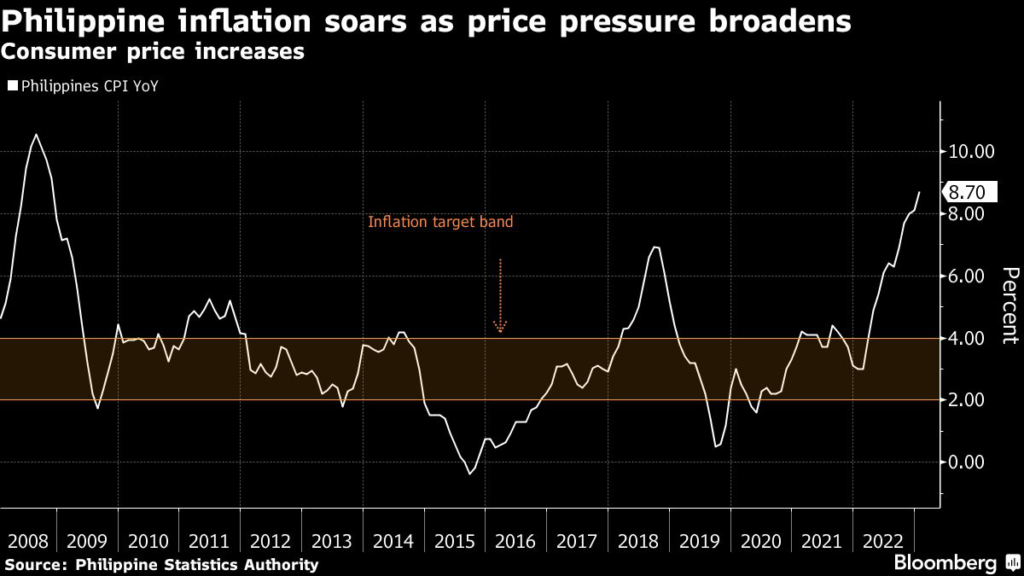Philippine inflation quickened to a fresh 14-year high, defying all expectations including that of the central bank’s and spurring bets of sustained policy rate increases to quell broadening price pressure.
(Bloomberg) — Philippine inflation quickened to a fresh 14-year high, defying all expectations including that of the central bank’s and spurring bets of sustained policy rate increases to quell broadening price pressure.
Consumer prices rose 8.7% in January from a year ago, Philippine Statistics Authority reported on Tuesday. That compares with 8.1% in December and a median estimate of 7.6% in a Bloomberg survey. Bangko Sentral ng Pilipinas had forecast last month’s inflation at 7.5%-8.3%.
“There are risks associated with relatively high inflation across different commodity groups,” National Statistician Dennis Mapa said at a briefing in Manila. The source of inflation is wide because the risk has spread, he said.
The January print — the fastest since November 2008 — went against earlier projections by some monetary officials that inflation probably peaked in December, suggesting that the rate pause which the Governor Felipe Medalla had pegged likely by the end of this quarter, will be delayed. The data also diverged from slowing trends in Indonesia and Thailand.
Nine out of thirteen categories including food, transport and utilities reported inflation past the central bank’s 4% upper-bound target, indicating that this price surge is broad-based, said Nicholas Mapa, an economist at ING Groep NV in Manila. “We believe Governor Medalla will whip out a 50-basis-point rate increase in an attempt to get ahead of surging inflation” next week.
Medalla over the weekend said BSP will focus on inflationary expectations when it meets to set policy on Feb. 16.
Food inflation in January accelerated to 10.7% year-on-year from 10.2%, according to Tuesday’s data. Housing and utilities costs increased by 8.5%. Core inflation, which strips out volatile food and energy items, quickened to 7.4% in January from 6.9%.
What Bloomberg Economics Says…
“With headline and core gauges still rising sharply, the only question is whether the central bank will hike by 25 or 50 basis points at its meeting on Feb. 16”
—Tamara Mast Henderson, Asean economist
Click to read the full note here
The impact of BSP’s 350-basis-point rate increases since May last year — its most-aggressive tightening cycle in two decades — is expected to be felt this year, National Economic and Development Authority said in a statement. The government is implementing measures to cool price growth and expects inflation to ease through 2024, it said.
Rizal Commercial Banking Corp.’s Michael Ricafort said price increases will slow coming from last year’s high base and as the country heads into the summer season that could boost harvest and food supply.
The Philippine peso fell as much as 0.8% against the dollar in early trading Tuesday, while the benchmark stock index declined as much as 0.7%.
“Price pressures are broad-based and BSP will likely need to sustain rate hikes until we see inflation head back towards target in a convincing manner,” ING’s Mapa said.
–With assistance from Cecilia Yap, Tomoko Sato and Michael J. Munoz.
(Updates with more details throughout.)
More stories like this are available on bloomberg.com
©2023 Bloomberg L.P.










